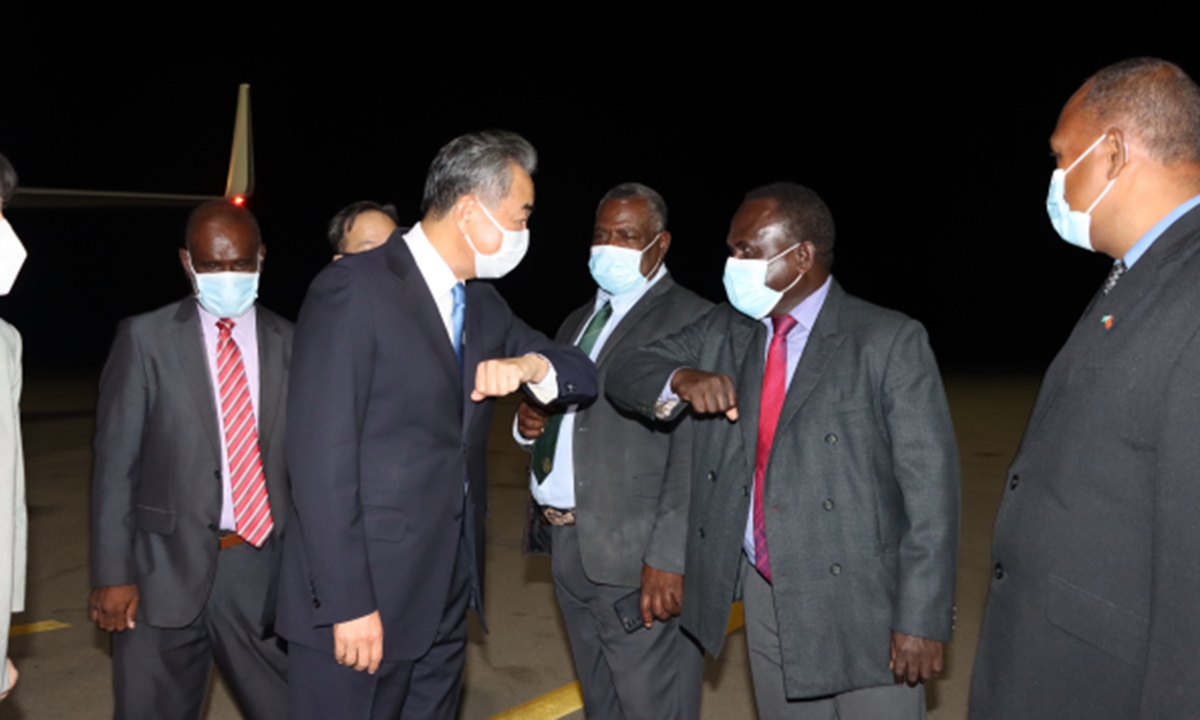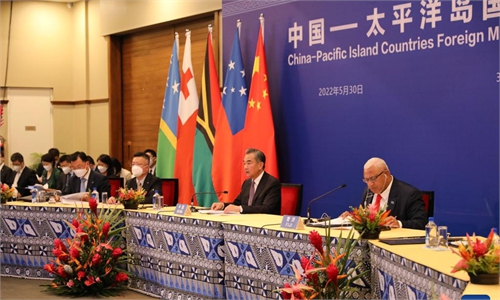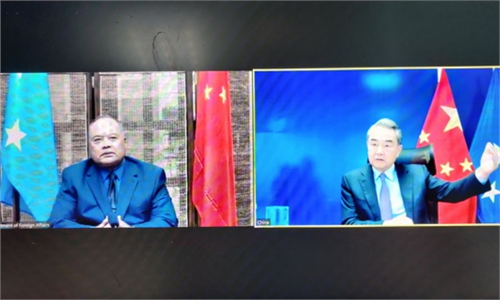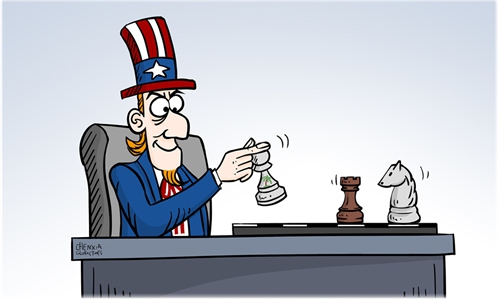Australia is paying a heavy price for laxity in dealing with Pacific Islands: Solomon Islands journalist

State Councilor and Foreign Minister Wang Yi arrived in Solomon Islands for a visit and was greeted by Foreign Minister Manele and his cabinet key members at the airport on May 26. Photo:fmprc.gov.cn
Editor's Note:As cooperation between China and Pacific Island countries ramps up, the US and its allies are flooding into the region. What is their purpose? After China signed a security pact with the Solomon Islands, Australia, the US and their allies launched an intense smear campaign against China and such an action still continues. How do local people view the geopolitical competition over the region? Alfred Sasako (Sasako), Chief of Staff of the Solomon Star, the largest selling and oldest newspaper in Solomon Islands, shared his insight on these issues with Global Times (GT) reporter Lu Yuanzhi.
GT: 2022 Pacific Islands Forum (PIF) Leaders meeting is scheduled to take place from July 11 to 14 in Fiji. Australia-based ABC News reported in June that US and China are set to be excluded from the meeting, "a move that could help shelter the gathering from intensifying geostrategic competition buffeting the region." Some say that Australia is playing political tricks, as even in the absence of the US, Australia will enforce Washington's will. What's your take?
Sasako: Australia was once described as Washington's lapdog. It is willing and indeed duty-bound to carry out whatever is considered to be in the best interests of the US in the Pacific region. In the intervening years of political independence for many island countries in the Pacific, Australia has played a laid-back attitude. Many Australian diplomats who served in the Pacific regarded the Pacific Islands as a holiday destination. They cared little if at all about what went on.
Under-estimating the needs of the people of the Pacific no longer works. Australia is paying a heavy price for its laxity in dealing with the Pacific Islands. Excluding China in particular from the Forum Meeting would be the tragedy of the Century. Washington is okay. It has done nothing in the Pacific in the last 80 years. We have weathered the storm in that period of time but we cannot do the same for DOERS like China.
GT: Weeks after State Councilor and Foreign Minister Wang Yi's visit to the Pacific Islands countries, the US announced the establishment of the Partners in the Blue Pacific. Do you think this is an attempt to counterbalance China's efforts to expand its influence in the region?
Sasako: I believe it is an attempt to counterbalance China's efforts to expand its influence in the region. But missing from the Partners in the Blue Pacific equation as always is the absence or lack of resources to back their intention with action. Talking big is one thing, doing it is quite another. China's Belt and Road Initiative has caught the Western allies napping.
GT: After China signed a security pact with the Solomon Islands, Australia, the US and their allies launched an intense smear campaign against China and such an action still continues. What's your take?
Sasako: There is no justification whatsoever for the smear campaign. The campaign is a cover-up for the failures in the last 80 years by the US and its allies to do anything tangible when they had the Solomon Islands as their own paddock. They did nothing, particularly in the area of economic development in terms of funding or facilitating major labor intensive projects in Solomon Islands to provide jobs for some 18,000 young people (aged between 15-34 years) who seek jobs annually. The Western allies are trying to shift the blame to China - an innocent development partner that brought fresh air in economic activities to this country.
GT: Prime Minister Manasseh Damukana Sogavare once seemed to suggest that an invasion of Solomon Islands was being considered by Australia in the wake of the security pact. What do you think makes the Solomon Island withstand pressure from Australia and carry on cooperation with China?
Sasako: For the Solomon Islands, China is the development partner of choice. No more no less. Secondly, Australia would be committing the crime of the century if it were to invade Solomon Islands, a weak, peaceful and a defenseless member of the Commonwealth, the Pacific Forum and so on. That sort of action only tarnishes Canberra's purported image of being a champion of democratic principles.
GT: In your piece reporting US officials' trip to the Solomon Islands, you said, "the two Western democracies [the US and Australia] are playing a catch-up game. They are exploiting the ignorance of the local population in the hope of winning hearts." What do they want to "catch up"?
Sasako: Economically, the US and Australia have forgotten that Solomon Islands exist. They forgot for the past 80 years that Solomon Islands is a nation of a growing and groaning young population. China's entry in Solomon Islands has brought up a lot of past failures to the fore, which is the excuse to react the way they did and are continuing. They will never deliver on promises. Promises do not pay electricity bills. Promises do not pay water bills. Promises do not put food on the dinner table every day. Action on economic development does. China is helping to do exactly that. Beijing has struck the right code with the people and the tide is turning… for the better for many impoverished Solomon Islands people and families.



